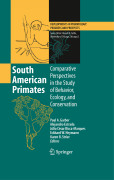
South american primates: comparative perspectives in the study of behavior, ecology, and conservation
Garber, P.A.
Estrada, A.
Bicca-Marques, J.C.
Heymann, E.W.
This will be the first time a volume will be compiled focusing on South American monkeys as models to address and test critical issues in the study of nonhuman primates. In addition, the volume will serve an important compliment to the book on Mesoamerican primates recently published in the series under the DIPR book series. The book will be of interest to a broad range of scientists invarious disciplines, ranging from primatology, to animal behavior, animal ecology, conservation biology, veterinary science, animal husbandry, anthropology, and natural resource management. Moreover, although the volume will highlight South American primates, chapters will not simply review particular taxa or topics. Rather the focus of each chapter is to examine the nature and range ofprimate responses to changes in their ecological and social environments, andto use data on South American monkeys to address critical theoretical questions in the study of primate behavior, ecology, and conservation. First time a volume will be compiled summarizing new approaches in the study of South American primate taxa Will be an important compliment to the book on Mesoamerican primates recently published Color insert INDICE: From the contents Overview of South American primate fauna, primate studies and conservation concerns. Systematics and Taxonomy.- Paleontology and historical biogeography.- Fossils, patterns and process in the evolution ofplatyrrhines.- Maternal investment and life history strategies.- Allometry, Body Mass, and primate feeding adaptations.- Long-term field studies of South American primates.- Sexual Selection, Female Choice and Mating Systems.- Genetic approaches to the study of kinship and primate dispersal.- The Reproductive Ecology of New World Primates.- Primate niche differentiation through sensory ecology.- Brains and cognition.- Decision Making in Primates: Integrating social and ecological information.- The Use of Vocal Communication in CoordinatingGroup Movements.- Predation risk and antipredator behaviors.- Using field andcaptive studies to understand primate social systems: the case of callitrichids.- New theories in the study of primate community ecology and niche partitioning.
- ISBN: 978-0-387-78704-6
- Editorial: Springer
- Encuadernacion: Cartoné
- Páginas: 445
- Fecha Publicación: 01/12/2008
- Nº Volúmenes: 1
- Idioma: Inglés
